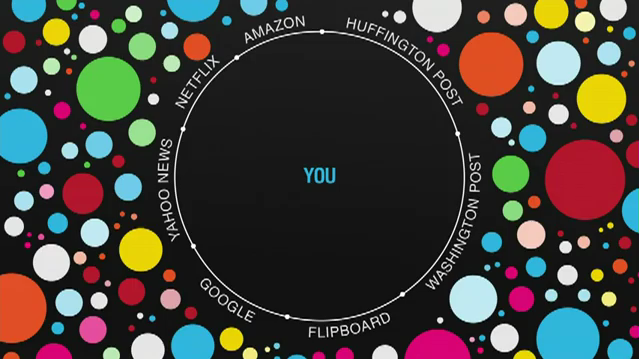
While Eli Pariser’s Ted talk was short and sweet, it was very eye opening for me. I found it extremely interesting that some of the most popular websites on the internet (like Facebook and Google) have recently began using an “invisible algorithmic editing of the web” according to what links are clicked on and what is searched. Another name for this is a filter bubble.
According to Pariser, there are up to 57 different factors that contribute to what exactly your tailored results are vs someone else’s; some that he mentioned are your location, and the computer/browser being used. I also found it interesting that even if a story is considered to be relevant or “trending’ news for a particular day, it could still show up on one persons search results but not another’s: Pariser showed an example of this when he asked two of his friends to search “Egypt” on Google and the results were remarkably different. He then goes on to explain that even some of the largest news outlets on the Internet (like Yahoo News) are now “personalized” aka showing the user what they think we want to see, based on their previous searches.
- Conservative– Townhall, Drudge Report, The Geller Report, Breitbart, and The Blaze
- Liberal– The Raw Story, Occupy Democrats, Huffington Post, The Intercept, and AlterNet
- Mainstream– NY Times, ABC News, Wall Street Journal, USA Today, and Politico
The common thread that I found between all three filter bubbles was *surprise, surprise,* Donald Trump. Two others that were frequently mentioned were the monologue that Jimmy Kimmel did regarding healthcare, and immigration policies. While each bubble is covering the same stories, it was ironic to see just how differently they each presented the information, or their “truth.” What I found interesting was the fact that depending on the source’s bias, each story was told from a completely different angle. For example: while the Jimmy Kimmel story was a common thread between all of the chosen sources, the Liberal media seems to support Kimmel and his argument while opposing media may have felt he was being a bit harsh by “attacking” host Brian Kilmeade.

Bottom line is: when the Internet shows us only what we like, or what it believes that we are most interested in seeing, we are getting cut off from the other different points of view that can assist in our greater understanding of the world that we live in. It is important for us to find ways to potentially ‘burst’ these bubbles that we have all been floating around in. According to an article by Illinois.edu, deleting your cookies and history from all browsers being used regularly, disabling tracking features on your devices, and keeping your Facebook/other social media accounts on private can all help to get outside of your bubble.

